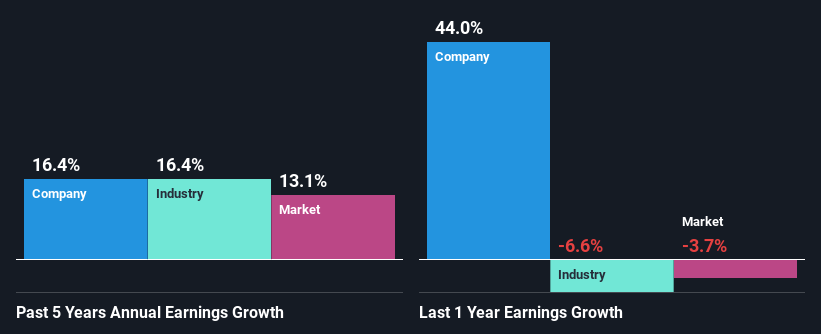Bruker Corporation's (NASDAQ:BRKR) Stock Has Been Sliding But Fundamentals Look Strong: Is The Market Wrong?
With its stock down 17% over the past month, it is easy to disregard Bruker (NASDAQ:BRKR). However, stock prices are usually driven by a company’s financial performance over the long term, which in this case looks quite promising. Specifically, we decided to study Bruker's ROE in this article.
Return on Equity or ROE is a test of how effectively a company is growing its value and managing investors’ money. In simpler terms, it measures the profitability of a company in relation to shareholder's equity.
See our latest analysis for Bruker
How Is ROE Calculated?
The formula for ROE is:
Return on Equity = Net Profit (from continuing operations) ÷ Shareholders' Equity
So, based on the above formula, the ROE for Bruker is:
30% = US$429m ÷ US$1.4b (Based on the trailing twelve months to December 2023).
The 'return' is the profit over the last twelve months. So, this means that for every $1 of its shareholder's investments, the company generates a profit of $0.30.
What Has ROE Got To Do With Earnings Growth?
Thus far, we have learned that ROE measures how efficiently a company is generating its profits. We now need to evaluate how much profit the company reinvests or "retains" for future growth which then gives us an idea about the growth potential of the company. Generally speaking, other things being equal, firms with a high return on equity and profit retention, have a higher growth rate than firms that don’t share these attributes.
Bruker's Earnings Growth And 30% ROE
Firstly, we acknowledge that Bruker has a significantly high ROE. Secondly, even when compared to the industry average of 12% the company's ROE is quite impressive. This probably laid the groundwork for Bruker's moderate 16% net income growth seen over the past five years.
Next, on comparing Bruker's net income growth with the industry, we found that the company's reported growth is similar to the industry average growth rate of 16% over the last few years.
The basis for attaching value to a company is, to a great extent, tied to its earnings growth. It’s important for an investor to know whether the market has priced in the company's expected earnings growth (or decline). Doing so will help them establish if the stock's future looks promising or ominous. Is BRKR fairly valued? This infographic on the company's intrinsic value has everything you need to know.
Is Bruker Efficiently Re-investing Its Profits?
Bruker has a low three-year median payout ratio of 9.5%, meaning that the company retains the remaining 91% of its profits. This suggests that the management is reinvesting most of the profits to grow the business.
Moreover, Bruker is determined to keep sharing its profits with shareholders which we infer from its long history of eight years of paying a dividend. Upon studying the latest analysts' consensus data, we found that the company's future payout ratio is expected to drop to 5.2% over the next three years. Regardless, the ROE is not expected to change much for the company despite the lower expected payout ratio.
Conclusion
In total, we are pretty happy with Bruker's performance. Specifically, we like that the company is reinvesting a huge chunk of its profits at a high rate of return. This of course has caused the company to see substantial growth in its earnings. With that said, the latest industry analyst forecasts reveal that the company's earnings growth is expected to slow down. Are these analysts expectations based on the broad expectations for the industry, or on the company's fundamentals? Click here to be taken to our analyst's forecasts page for the company.
Have feedback on this article? Concerned about the content? Get in touch with us directly. Alternatively, email editorial-team (at) simplywallst.com.
This article by Simply Wall St is general in nature. We provide commentary based on historical data and analyst forecasts only using an unbiased methodology and our articles are not intended to be financial advice. It does not constitute a recommendation to buy or sell any stock, and does not take account of your objectives, or your financial situation. We aim to bring you long-term focused analysis driven by fundamental data. Note that our analysis may not factor in the latest price-sensitive company announcements or qualitative material. Simply Wall St has no position in any stocks mentioned.

 Yahoo Finance
Yahoo Finance 
